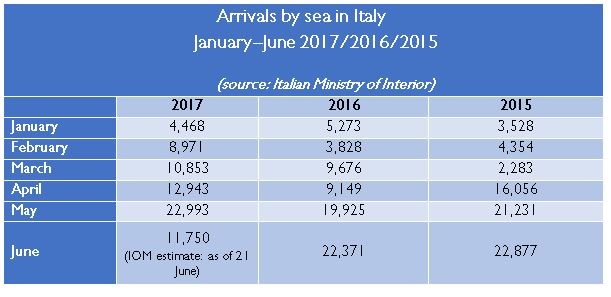-
Who we are
WHO WE AREThe International Organization for Migration (IOM) is part of the United Nations System as the leading inter-governmental organization promoting since 1951 humane and orderly migration for the benefit of all, with 175 member states and a presence in 171 countries.
-
Our Work
Our WorkAs the leading inter-governmental organization promoting since 1951 humane and orderly migration, IOM plays a key role to support the achievement of the 2030 Agenda through different areas of intervention that connect both humanitarian assistance and sustainable development.
What We Do
What We Do
Partnerships
Partnerships
Highlights
Highlights
- Where we work
-
Take Action
Take Action
Work with us
Work with us
Get involved
Get involved
- Data and Research
- 2030 Agenda
Mediterranean Migrant Arrivals Reach 83,928 in 2017; 2,108 Deaths
Switzerland – The UN Migration Agency (IOM) reports that 83,928 migrants and refugees entered Europe by sea in 2017 through June 21, with almost 85 per cent arriving in Italy and the remainder divided between Greece, Cyprus and Spain. This compares with 215,997 arrivals across the region through 21 June 2016.
MEDITERRANEAN DEVELOPMENTS

IOM Rome spokesperson Flavio Di Giacomo reported that some 180 migrants were rescued yesterday on the open sea and are being brought to land in Italy. He added more than 2,500 migrants who had been rescued in the past few days (including last weekend) arrived safely and have been transferred to different locations in Italy.
The roughly 72,000 migrants recorded so far this year by Italy’s Ministry of the Interior compares with January-through-June figures of 70,222 men, women and children in 2016 and 70,329 in 2015 (See chart below).

IOM Italy also reported this week that the total number of Syrian migrants registered as having arrived by sea is 1,164 – making Syrians the fourteenth most common nationality. In 2016 1,200 Syrians landed by sea in Italy.
IOM Libya Christine Petré reported Thursday (22 June) that the remains of 18 migrants found in Garaboli were retrieved and buried by local citizens. Two migrants were reportedly found alive and were transferred to Trig al Seka detention centre in Tripoli. On the same day, the remains of five men were found in Tajoura, west of the Libyan capital Tripoli.
As of 22 June, 10,034 migrants were rescued in Libyan waters and the remains of 303 women, men and children have been found along the Libyan coast.
IOM’s Missing Migrants Project (MMP) notes total deaths on the Mediterranean this year now stand at 2,108. Although that total is more than 800 fewer than the number of deaths that were recorded at this time last year, it nonetheless marks the fourth consecutive year migrant deaths on the Mediterranean Sea have exceeded 2,000 and brings the total number of deaths on the Mediterranean since early 2013 to nearly 15,000 – or a daily average of 10 men, women and children since this current emergency began.
Worldwide, the IOM Missing Migrants Project (MMP) reports that there have been 2,848 fatalities through 21 June (see chart below) with the Mediterranean region accounting for the largest proportion of deaths – over 70 per cent of the global total.
MMP regional figures for today reflect the following inclusions since Tuesday (20 June): two incidents on the US/Mexico border; a train accident in Central America; 110 missing off the coast of Zuwarah, Libya, as reported by survivors rescued by Libyan fishermen last Saturday; seven missing in the Central Mediterranean as reported by survivors taken to Messina, Italy; and five dead off the coast of Sabratha, Libya. These data do not include the 23 victims newly reported in Libya on Thursday, nor reports of three bodies discovered this week near Falfurrias, Texas.
For the latest Mediterranean Update infographic: http://migration.iom.int/docs/MMP/230617_Mediterranean_Update.pdf
For latest arrivals and fatalities in the Mediterranean, please visit: http://migration.iom.int/europe
Learn more about the Missing Migrants Project at: http://missingmigrants.iom.int
For further information, please contact:
Joel Millman at IOM HQ, Tel: +41 79 103 8720, Email: jmillman@iom.int
Flavio Di Giacomo at IOM Italy, Tel: +39 347 089 8996, Email: fdigiacomo@iom.int
Kelly Namia at IOM Greece, Tel: +30 210 991 2174, Email: knamia@iom.int
Julia Black at IOM GMDAC, Berlin, Tel: +49 30 278 778 27, Email: jblack@iom.int
Christine Petré at IOM Libya, Tel: +216 29 240 448, Email: chpetre@iom.int
